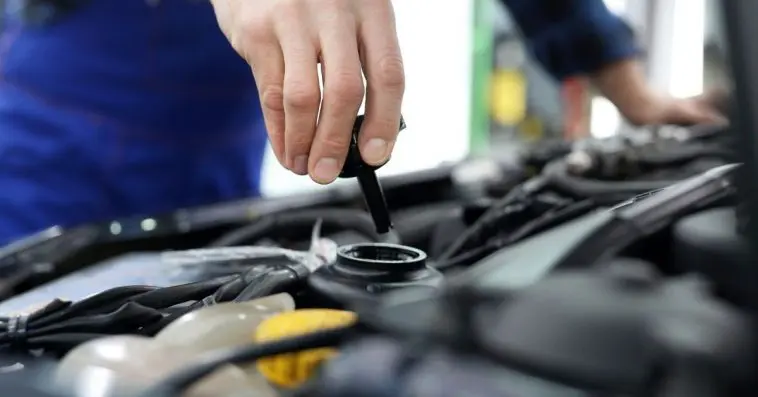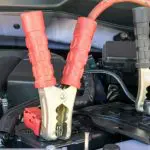Ever thought how difficult it would be if you didn’t have power steering?
Let me just say that its invention in 1951 brought a huge relief to the drivers. But what if you start hearing power steering noise?
Power steering is a hydraulic system that builds pressure using the fluid present to steer the car.
When it runs into any trouble, the first indication is a whining noise, which varies depending on the speed. But what causes it?
- Low steering fluid
- Trapped air
- Slipped drive belt
- Worn out pump
- Failing power steering pump
- Wobbly pulley
- Clogged power steering hose
- Faulty power steering pump
- Condition of the Fluid
Even though you haven’t yet heard a power steering noise, you will identify it once you hear.
It is a pretty distinguishable whining sound, and you can clearly identify the location. When left unchecked, it is sure to get out of hand and lead to power steering failure.
TABLE OF CONTENTS
Symptoms Of A Bad Or Failing Power Steering Pump That Causes Noise
The power steering in your car ought to be smooth and noiseless. But sometimes, when issues arise, a low whining sound is the first indication.
It may be due to the belts slipping or even the pump itself. You better get your car checked out at your mechanic’s before the entire system fails.
Low Steering Fluid
Low fluid level is by far the most common issue when it comes to power steering noise.
There is not much knowledge about the maintenance of power steering and fluid among the drivers. Hence many ignore checking the fluid.
As with other fluid in the car, power steering fluid levels needs to be checked and replaced if needed.
It can get contaminated with debris and achieve a sludge-like texture. Unlike the engine oil, this happens slowly. The levels can also go low due to unidentified leaks.
The power steering system has a lot of moving parts. Hence proper lubrication is vital to its well-being.
If the fluid level is low, the metal parts can get overheated, and the friction can cause it to wear out.
Sometimes, the parts can also weld together due to the relentless grinding of the parts. If so, you would have to change the entire system, which is a pricey venture.
Unfortunately, there is no way to find out the low fluid level in the system, unlike engine oil. The only way is to find out is through the symptoms.
You also keep to eye on when the whining turns to groan, especially when turning and at low speeds. It means that the system is about to fail, and you need to get it checked.
Leaks
Leaks may also be the cause of low fluid level. You can identify it distinctively when you find it difficult to turn the car, and the power steering pump causes noises.
You can look for noises around the fluid reservoir.
Leaky pumps make the steering noisy and also uncharacteristically heavy. A simple remedy is the pour-n-go formulas that is an easy fix to stop a leaking power steering.
Condition Of The Fluid
If the fluid reservoir is full, your fluid may be to blame for the whining noise you hear from the power steering. It can also be that the fluid has lost its properties and additives.
The change in viscosity can also create problems for the steering. It can be due to any or all of the reasons below:
- Contamination due to metal parts
- Debris clogging the system
- Degradation of the fluid
In short, if the fluid is dark and sludgy, it is time to change it. Keep an eye on your reservoir, as you do with your engine oil.
Trapped Air
The chances are that the power steering noise when driving may also be due to air bubbles caught in the steering structure.
The air causes the classic whining noises and vibrations. You may also hear popping sounds from the air bubbles that pop when moving through the system.
Another indication of bubbles is your steering getting heavy and difficult to operate, but this happens only when there is too much air trapped.
You can check for bubbles in the fluid reservoir. Remove the cap, and look for bubbles or froth floating above.
But generally, identifying trapped air is quite complicated and is only considered after checking the oil level and also the pump.
Therefore, the only solution is to flush all the fluid out and replace it with a new one.
Slipped Drive Belt
Power steering noise when turning is associated with a slipped drive belt. The drive belt can be seen in the power steering pump and helps to turn.
When it slips, it prevents the car from changing directions due to the loss of pressure as there is nothing operating the pump.
The drive belt slipping off is a common problem associated with power steerings.
The issue is characterized by a squealing noise that is noticeable, especially when taking sharp turns or when there is heavy demand on the steering.
If you hear a power steering noise when cold, the belt may also to blame especially in older cars.
With age, the belt loses its traction and can slip off easily. Other than the irritating noise, a slipping belt can cause the power steering to not function, which can turn to be dangerous.
Worn Out Pump
The older it is, the more wear and tears your car is subjected to. The internal parts and the seals present inside the power steering also feel the debilitating effects of age and lose the pressure.
As the pump continues to wear out, you can feel it in the squealing noise of the pump. The power steering also becomes difficult to operate.
You need to get it checked at a mechanic to see if anything can be done. Since the steering system is expensive, it is advisable to change your car.
If you keep going, the pump can give out at any time, followed by a total loss of pressure leading to the power steering failure.
Failing Power Steering Pump
Another classic reason for the whining noises from the pump is due to the failing power steering. Other than the noise, it is also indicated by leaking fluid and difficulty in steering.
Similar to a low fluid level, you may also notice whining and groaning sounds emanating from the pump. In this case, the low level is due to the pump itself leaking the fluid.
If your pump is failing, it may be the cause of the power steering noise on startup. On the turn of the key, your pump might give you a squealing noise as it engages and continues for a minute or two.
In case your pump has been giving you more problems, you may want to change the pump before the entire system fails on you.
Wobbly Pulley
Over time leaks may develop around the sealing of the pulley.
That and a loose pulley may also cause a whining sound that is characteristic of power steering. But in this case, this is a symptom of your power steering pump failing.
Bad bearings may also cause a similar sound, so you better be sure if you are going to replace your pump with a new one.
Clogged Power Steering Hose
The same whining sound can be heard when the power steering hose is clogged for some reason.
You can hear it clearly when you turn the wheel; A clogged hose makes it difficult for you to turn the steering, which may not be ideal in times of emergency.
So, the moment you feel this in your steering, make arrangements to deal with the clog. A hose is not the only place that is clogged. You can also feel it in gears connected to the pump as well.
Faulty Power Steering Pump
If the noise you hear from the power steering is a low humming, rest assured that it is from a faulty power steering pump. While it manifests as a humming sound, it changes pitch along with the RPM.
If the fault is too severe, you might see leaks around the most important part, which is the shaft.
While a shaft looks inconsequential, it brings together the power steering system. If it fails, so does your steering. So, any issues with the shaft must be handled immediately to avoid escalating costs.
Fix Your Power Steering
Noises you hear from the power steering is mostly the start of an issue. Any power steering noise fix needs to be done at the right time; otherwise, it may cause permanent damage to the system.
Unless you are a professional yourself, seek the service of your mechanic due to their complexity.
If the fluid is the issue, you are fortunate and escape with just replacing it.
If the parts are worn out, or the pump is faulty, you might have to spend. The entire system is damaged, and you might want to get a loan.
Examine The Source Of The Noise
The steering pump and the system are also located under the hood, so first, make sure the noise you hear is from the steering and not the engine.
Not every sound is from the steering; a failing engine may also be noisy. Concentrate on the noise, and find out where it is coming from.
Once you identify the source of the noise, find out how it sounds; whining or groaning, or squealing. Each of these sounds signifies a different issue.
Once you identify the noise, you can narrow down to the problem. Few can be rectified yourself, while the rest may have to be handled by a professional.
If you are determined to continue the work, drive the car at different speeds, do a sharp turn, and spin the steering. A mix of these moves should give you a clear idea about the problem at hand.
Change The Fluid
In most cases, noise is due to the power steering fluid. Low fluid, contaminated fluid, and trapped air in fluid all require a flush of the system.
Open the fluid reservoir and check the oil. If it is murky and contaminated with debris and metal shavings, it is time to change it.
Flush the system to remove all the traces of the old oil and refill with a new one. Choose a fluid that is quiet and additives that prevent leaks and slipping.
Check the manual for the correct level, and fill to the required capacity.
Drive your car for a few miles, and once the new fluid circulates, the sound should have gone. If the sound doesn’t return, all is well and good, but keep an eye on the fluid level.
In case it reduces, there may be a leak in one of the seals. You have two options: to change the seals or to add an additive.
If the sound is still there, you are facing a much bigger issue may be pump damage.
Do not attempt to dismantle or to fix it yourself. Contact your mechanic or an auto service center for a professional opinion.
FAQs
Q1. How Much Does It Cost To Replace A Power Steering Pump?
It may cost anywhere from $350 to $700 to fix an issue with a power steering pump. In this case, the parts cost more than the labor since the pump is easily accessible in the engine bay.
The pump may cost between $200 – $450 depending on your vehicle. Your mechanic, on the other hand, would charge you from $150 – $250.
Q2. Can I Drive A Car With Bad Power Steering?
Theoretically, yes you can! But you need to put your entire strength to get your wheels to turn, and you may not be able to do so in an emergency.
And again, the longer the issue persists, the more damage you incur, and higher your repair bills would be.
Q3. How To Tell If The Power Steering Pump Is Bad Or Rack And Pinion?
You can identify a pump failure with heavy steering, leaking fluids, and squealing noise.
On the other hand, rack and pinion issues will have loose or unsteady steering and leaking or teeth in the rack or pinion.
Conclusion
Power steering is one of the most underrated parts of your car that most drivers take for granted.
Most do no maintenance and completely ignore it until any issue arises. As long as it is in good working condition or a newer vehicle, it should not be a problem.
But when it starts to fail is when all the issues arise. One of the most important symptoms is the noises coming from the power steering.
It is now that you need to pay attention to your steering and get it checked by a mechanic. Best you rectify the issues now rather than later lest it turns to something big.




